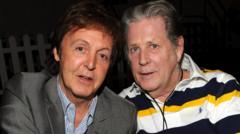Pope Francis, a voice for the marginalized, leaves behind a legacy of inclusivity and compassion as the Catholic Church braces for leadership transition.
**Global Mourning as Pope Francis Passes Away at Age 88**

**Global Mourning as Pope Francis Passes Away at Age 88**
The world reflects on the legacy of Pope Francis following his death due to a stroke, marking the end of a transformative papacy.
Over the past few days, a palpable sense of grief has enveloped the globe as millions mourn the passing of Pope Francis, who died on April 21 at the age of 88 due to a stroke. The Vatican confirmed the news in a solemn statement, highlighting his lifelong dedication to service and the impact he made during his 12-year papacy.
His death came as a shock to many, happening just a day after he appeared in public for Easter Sunday, blessing thousands gathered in St. Peter's Square. Mourners quickly filled St. Peter's Square upon hearing the news, remembering Francis not only as the Pope but also as a spiritual leader who championed social justice, humanitarianism, and the rights of the marginalized.
Described as a “man of peace,” Francis rose from humble beginnings in Argentina to lead a global congregation of over a billion Catholics. His papacy was marked by a commitment to inclusivity, emphasizing the importance of addressing the needs of immigrants, the poor, and environmental issues. His message often resonated beyond the Catholic faith, appealing to a diverse audience around the world.
As Pope Francis alighted from this world, the Vatican’s administrative responsibilities now temporarily lie with Cardinal Kevin Farrell, who will oversee affairs until a new pope is elected. Following centuries-old traditions, a conclave of cardinals will commence within 15 to 20 days to select his successor.
Tributes pour in from world leaders and faith communities as they reflect on Francis’ indelible mark. From the United Nations, Secretary-General António Guterres hailed the Pope's contributions to humanitarian and environmental discourse. Former U.S. President Barack Obama stated that Francis inspired people globally to become better versions of themselves.
As discussions surrounding potential leaders for the Catholic Church begin, speculation arises over who will continue the progressive agenda set forth by Francis or revert to more traditional stances. The selection process is steeped in tradition and secrecy and has gained additional public interest following the release of the film "Conclave," depicting the inner workings of papal elections.
In the United States, devotees gathered at churches to honor the Pope’s legacy, many expressing hope for a successor who embodies the same compassion and progressive values as Francis. His push for human dignity extended to advocating for LGBTQ rights, environmental justice, and global harmony, leaving a legacy that undoubtedly reshapes the future of the church.
As the world continues to honor his memory, the question remains: what direction will the Roman Catholic Church take in the as-yet-unknown future? Only time and the choices of the cardinals will tell.
His death came as a shock to many, happening just a day after he appeared in public for Easter Sunday, blessing thousands gathered in St. Peter's Square. Mourners quickly filled St. Peter's Square upon hearing the news, remembering Francis not only as the Pope but also as a spiritual leader who championed social justice, humanitarianism, and the rights of the marginalized.
Described as a “man of peace,” Francis rose from humble beginnings in Argentina to lead a global congregation of over a billion Catholics. His papacy was marked by a commitment to inclusivity, emphasizing the importance of addressing the needs of immigrants, the poor, and environmental issues. His message often resonated beyond the Catholic faith, appealing to a diverse audience around the world.
As Pope Francis alighted from this world, the Vatican’s administrative responsibilities now temporarily lie with Cardinal Kevin Farrell, who will oversee affairs until a new pope is elected. Following centuries-old traditions, a conclave of cardinals will commence within 15 to 20 days to select his successor.
Tributes pour in from world leaders and faith communities as they reflect on Francis’ indelible mark. From the United Nations, Secretary-General António Guterres hailed the Pope's contributions to humanitarian and environmental discourse. Former U.S. President Barack Obama stated that Francis inspired people globally to become better versions of themselves.
As discussions surrounding potential leaders for the Catholic Church begin, speculation arises over who will continue the progressive agenda set forth by Francis or revert to more traditional stances. The selection process is steeped in tradition and secrecy and has gained additional public interest following the release of the film "Conclave," depicting the inner workings of papal elections.
In the United States, devotees gathered at churches to honor the Pope’s legacy, many expressing hope for a successor who embodies the same compassion and progressive values as Francis. His push for human dignity extended to advocating for LGBTQ rights, environmental justice, and global harmony, leaving a legacy that undoubtedly reshapes the future of the church.
As the world continues to honor his memory, the question remains: what direction will the Roman Catholic Church take in the as-yet-unknown future? Only time and the choices of the cardinals will tell.






















